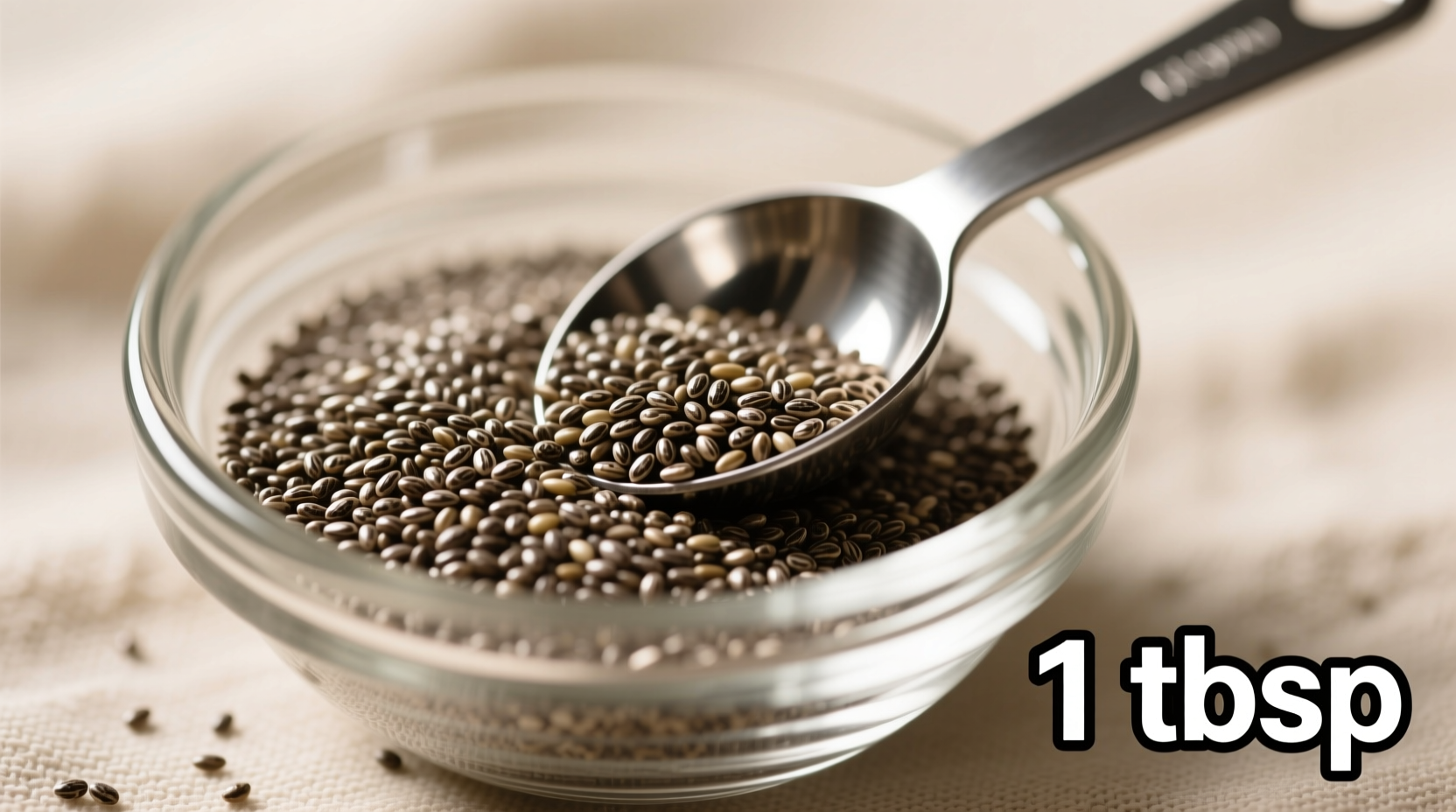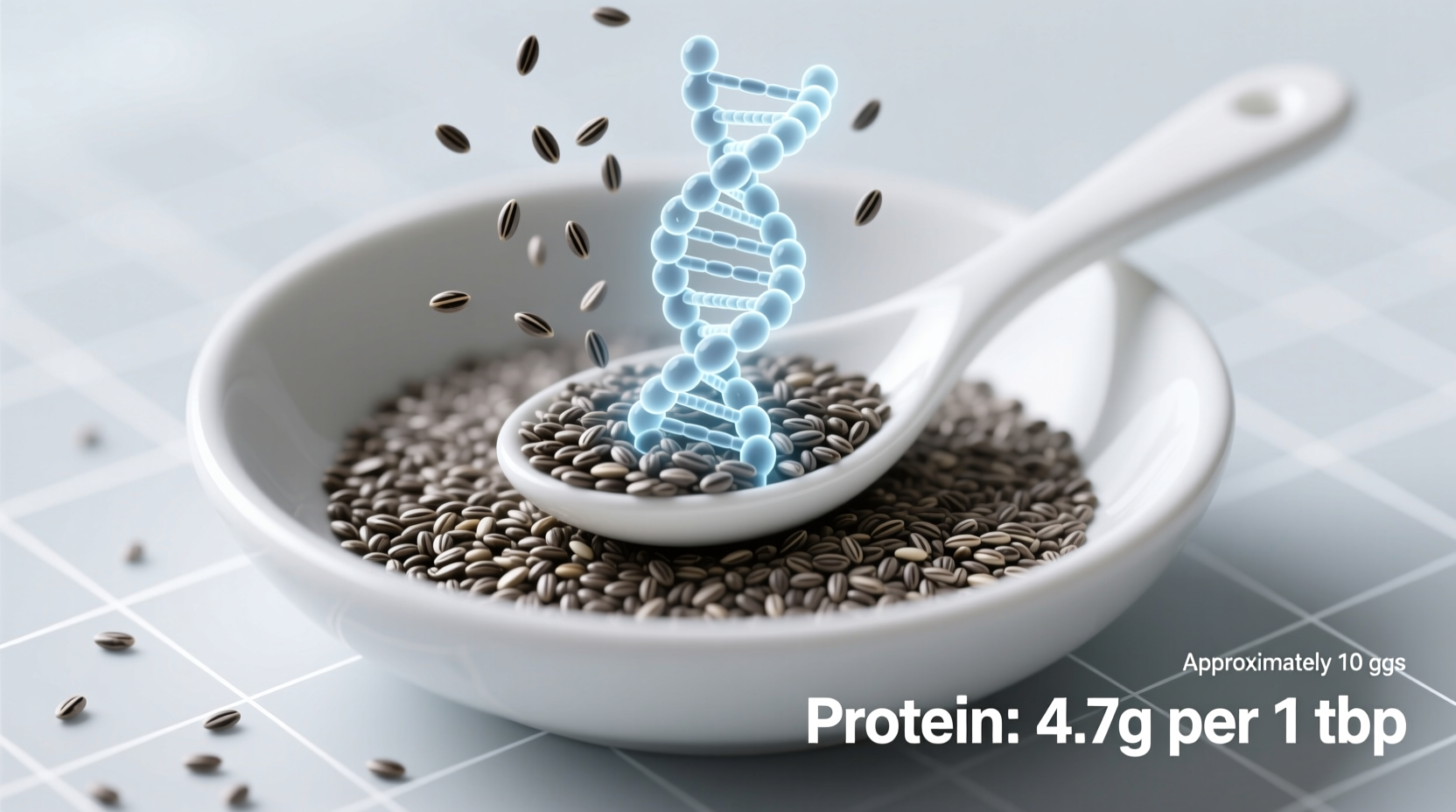One tablespoon (12g) of chia seeds contains approximately 1.6 grams of complete protein, according to the USDA FoodData Central database. This represents about 3% of the daily recommended protein intake for an average adult, making chia seeds a valuable plant-based protein source that contains all nine essential amino acids.
Chia seeds have surged in popularity as a nutritional powerhouse, but many people still wonder exactly how much protein they're getting when they sprinkle these tiny seeds into their morning smoothie or yogurt. Understanding the precise protein content helps you make informed dietary choices, especially if you're tracking your macronutrient intake or following a plant-based diet.
Why Chia Seeds' Protein Matters for Your Diet
While 1.6 grams per tablespoon might not seem substantial compared to animal proteins, chia seeds offer something special: a complete protein profile. Unlike many plant proteins that lack certain essential amino acids, chia seeds contain all nine essential amino acids your body cannot produce on its own. This makes them particularly valuable for vegetarians, vegans, and anyone looking to diversify their protein sources.
Dr. David Heber, former director of the UCLA Center for Human Nutrition, explains: "Chia seeds are among the few plant foods that provide a complete protein, meaning they contain all the essential amino acids in sufficient amounts that our bodies need but cannot produce."
Complete Nutritional Breakdown of 1 Tbsp Chia Seeds
Beyond protein, chia seeds deliver an impressive array of nutrients in that single tablespoon serving:
- Fiber: 4.1 grams (14% of daily value)
- Omega-3 Fatty Acids: 2.5 grams
- Calcium: 63 mg (5% of daily value)
- Magnesium: 42 mg (10% of daily value)
- Phosphorus: 63 mg (5% of daily value)
This nutrient density explains why chia seeds were valued by ancient Aztec and Mayan civilizations as a survival food that provided sustained energy during long journeys and battles.
How Chia Seeds Compare to Other Protein Sources
Understanding where chia seeds fit in the protein landscape helps you make strategic dietary choices. Here's how one tablespoon of chia seeds compares to other common protein sources:
| Food Source | Protein per Serving | Complete Protein? | Calories |
|---|---|---|---|
| Chia seeds (1 tbsp) | 1.6g | Yes | 58 |
| Flax seeds (1 tbsp) | 1.3g | No | 37 |
| Hemp seeds (1 tbsp) | 3.3g | Yes | 57 |
| Almond butter (1 tbsp) | 3.4g | No | 98 |
| Quinoa (1/4 cup dry) | 6g | Yes | 160 |
This comparison reveals chia seeds' unique position: they provide complete protein with significantly more fiber than most alternatives, though they contain less protein per serving than some other plant sources like hemp seeds or quinoa.
Practical Ways to Maximize Protein Absorption from Chia Seeds
While chia seeds offer complete protein, their protein digestibility is approximately 66%, according to research published in the Journal of Agricultural and Food Chemistry. To maximize protein absorption:
- Soak before consuming: Soaking chia seeds in water or plant-based milk for 15-30 minutes breaks down enzyme inhibitors and improves digestibility
- Pair with vitamin C-rich foods: Combining chia seeds with citrus fruits or berries enhances iron absorption, which supports protein metabolism
- Grind when possible: Lightly grinding chia seeds before consumption increases nutrient bioavailability
- Combine with complementary proteins: Pair chia seeds with other plant proteins like beans or lentils for enhanced amino acid profile

When Chia Seeds Shine as a Protein Source (and When They Don't)
Chia seeds excel as a protein source in specific dietary contexts but have limitations to understand:
Situations where chia seeds are particularly valuable:
- As a convenient, shelf-stable protein boost for smoothies and beverages
- For individuals with nut allergies seeking alternative protein sources
- When additional fiber is needed alongside protein
- As a binding agent in vegan recipes that also contributes protein
Limitations to consider:
- Not sufficient as a sole protein source due to moderate protein density
- Lower protein-to-calorie ratio compared to some other plant proteins
- May cause digestive discomfort if consumed in large quantities without adequate water
Putting Chia Seeds Protein in Daily Context
The Recommended Dietary Allowance (RDA) for protein is 0.8 grams per kilogram of body weight for the average adult. For a 150-pound (68 kg) person, this equals about 54 grams of protein daily.
While one tablespoon of chia seeds provides 1.6 grams of protein (about 3% of daily needs), incorporating two to three tablespoons daily contributes meaningfully to your protein intake while also delivering fiber, healthy fats, and minerals. Registered dietitians often recommend combining chia seeds with other protein sources throughout the day for optimal amino acid balance.
As Dr. Joanne Slavin, a registered dietitian and nutrition professor at the University of Minnesota, notes: "Chia seeds work best as part of a varied protein portfolio rather than as a primary protein source. Their real value comes from the combination of protein, fiber, and healthy fats in one convenient package."
Common Misconceptions About Chia Seed Protein
Several myths persist about chia seeds and protein that deserve clarification:
- Myth: Chia seeds contain more protein than animal sources
Reality: While chia seeds offer complete protein, they contain less protein per serving than most animal proteins. Three ounces of chicken breast provides about 26 grams of protein compared to 1.6 grams in one tablespoon of chia seeds. - Myth: You need to eat large quantities of chia seeds to get significant protein
Reality: Two to three tablespoons daily provides 3.2-4.8 grams of protein along with other valuable nutrients without excessive calorie intake. - Myth: Chia seed protein is inferior to animal protein
Reality: While animal proteins generally have higher protein density and digestibility, chia seeds provide complete protein with additional fiber and healthy fats that animal proteins lack.
How to Incorporate Chia Seeds for Optimal Protein Benefits
Maximize the protein benefits of chia seeds with these practical strategies:
- Morning boost: Add one tablespoon to your morning smoothie (provides 1.6g protein plus fiber)
- Overnight oats: Mix two tablespoons into overnight oats for a protein-rich breakfast (3.2g protein)
- Salad topper: Sprinkle one tablespoon over salads for added crunch and protein (1.6g protein)
- Homemade energy bars: Include three tablespoons in energy bar recipes (4.8g protein)
- Chia pudding: Prepare chia pudding with plant-based milk for a protein-rich snack (2-3 tablespoons = 3.2-4.8g protein)
Remember that chia seeds absorb up to 10 times their weight in water, so always consume them with adequate fluids to prevent digestive discomfort.
Scientific Perspective on Chia Seed Protein Quality
Research published in the British Journal of Nutrition confirms that chia seeds contain all nine essential amino acids, with particularly high levels of lysine, which is often limited in other plant proteins. However, the protein digestibility-corrected amino acid score (PDCAAS) for chia seeds is approximately 0.66, compared to 1.0 for egg white and whey protein.
This means that while chia seeds provide complete protein, your body doesn't absorb and utilize all the protein as efficiently as it would from some animal sources. This is why nutrition experts recommend combining chia seeds with other protein sources throughout the day for optimal amino acid balance.
Final Thoughts on Chia Seeds as a Protein Source
With 1.6 grams of complete protein per tablespoon, chia seeds offer a valuable plant-based protein option that delivers additional nutritional benefits beyond just protein. While not the highest protein source by volume, their complete amino acid profile, fiber content, and versatility make them a worthwhile addition to a balanced diet.
For optimal results, incorporate chia seeds as part of a diverse protein portfolio rather than relying on them as your primary protein source. When combined with other plant proteins throughout the day, they contribute meaningfully to your daily protein needs while providing fiber, healthy fats, and essential minerals.
Frequently Asked Questions
How much protein is actually in one tablespoon of chia seeds?
One tablespoon (12 grams) of chia seeds contains approximately 1.6 grams of complete protein, according to the USDA FoodData Central database. This represents about 3% of the daily recommended protein intake for an average adult.
Are chia seeds considered a complete protein source?
Yes, chia seeds are considered a complete protein source because they contain all nine essential amino acids that the human body cannot produce on its own. This makes them particularly valuable for vegetarians and vegans looking to diversify their protein sources.
How many tablespoons of chia seeds should I eat daily for protein?
For meaningful protein contribution without excessive calorie intake, most nutritionists recommend 2-3 tablespoons (24-36g) of chia seeds daily. This provides 3.2-4.8 grams of protein along with fiber, healthy fats, and minerals. Always consume with adequate water as chia seeds absorb up to 10 times their weight in liquid.
Do I need to grind chia seeds to get the full protein benefits?
While whole chia seeds still provide protein, grinding them slightly can improve protein digestibility and nutrient absorption. Research shows that grinding or soaking chia seeds breaks down enzyme inhibitors and increases the bioavailability of nutrients. Soaking for 15-30 minutes before consumption also enhances digestibility without requiring grinding.
How does chia seed protein compare to other plant proteins?
Chia seeds provide complete protein but have moderate protein density compared to other plant sources. One tablespoon (12g) contains 1.6g protein, while hemp seeds (1 tbsp) provide 3.3g and quinoa (1/4 cup dry) offers 6g. However, chia seeds deliver significantly more fiber than most alternatives. They work best as part of a varied protein portfolio rather than as a primary protein source.











 浙公网安备
33010002000092号
浙公网安备
33010002000092号 浙B2-20120091-4
浙B2-20120091-4